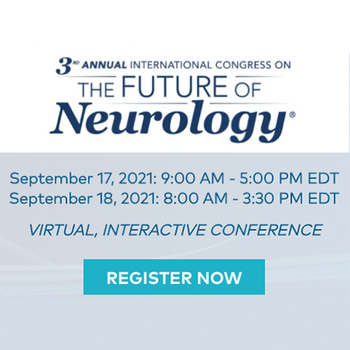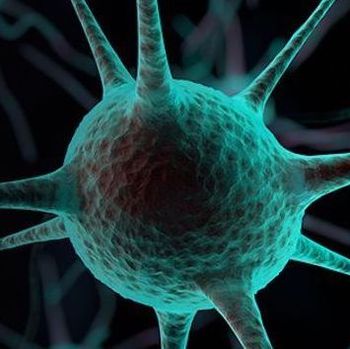
Bruce Cree, MD, PhD, clinical research director of the UCSF Multiple Sclerosis Center, provided context on the status of patient education efforts and clinical development for neuromyelitis optica spectrum disorder.

Matt Hoffman, Editorial Director for NeurologyLive, has covered medical news for MJH Life Sciences, NeurologyLive’s parent company, since 2017. He executive produces the NeurologyLive Mind Moments® podcast, and hosted the Medical World News show Deep Dive. Follow him on Twitter @byMattHoffman or email him at [email protected]

Bruce Cree, MD, PhD, clinical research director of the UCSF Multiple Sclerosis Center, provided context on the status of patient education efforts and clinical development for neuromyelitis optica spectrum disorder.

MicroTransponder’s system is the first of its kind to be granted this indication, after supporting data from the VNS-REHAB trial suggested its efficacy in improving FMA-UE scores.

"Mind Moments," a podcast from NeurologyLive, brings you an exclusive interview with Adolfo Ramirez-Zamora, MD.

The toolkit’s assays contain several biomarkers, including Aß 1-42, Aß 1-40, α-syn, GFAP, IL-6, neurogranin, NfL, phosphotau181, S100B, sTREM2, total tau, and YKL-40.

The clinical research director of the UCSF Multiple Sclerosis Center shared his perspective on the history of clinical care for neuromyelitis optica spectrum disorder in light of 3 recent FDA approvals.

The long-acting C5 complement inhibitor, developed by Alexion and approved for atypical hemolytic uremic syndrome and paroxysmal nocturnal hemoglobinuria (PNH), failed to show an effect on ALSFRS-R score.

The full approval for BNT162b2 (Comirnaty; Pfizer/BioNTech) will afford physicians greater prescribing capability and is expected to play a role in driving workplace vaccine mandates.

This NeurologyLive® Peers & Perspectives series features experts in the diagnosis and treatment of Alzheimer disease discussing the recent approval of aducanumab, its implications for Alzheimer disease, and other promising therapies and diagnostic technologies in development.

After the FDA approval for Jazz Pharmaceuticals' oxybates combination therapy, Robert Iannone, MD, MSCE, offered insight into the potential effects the drug may have on the clinical care of patients with idiopathic hypersomnia.

Program chairs Fred D. Lublin, MD, and Stephen Silberstein, MD, offer insight into the third annual IFN meeting, which is set for September 17-18, 2021, to be held in a virtual setting.

"Mind Moments," a podcast from NeurologyLive, brings you an exclusive interview with Mitchell S.V. Elkind, MD, MS, MPhil.

The professor of brain science and director of the Chambers-Grundy Center for Transformative Neuroscience at UNLV spoke to the recently published HARMONY phase 3 study data.

Branded as Nexviazyme, Sanofi’s enzyme replacement therapy demonstrated key improvements in measures of disease burden while maintaining its known safety profile.

Cummings and colleagues presented appropriate use criteria for the newly approved Biogen/Eisai agent at the 2021 Alzheimer’s Association International Conference.

"Mind Moments," a podcast from NeurologyLive, brings you an exclusive interview with Jessica Zwerling, MD, MS.

Jessica L. Stulc, MD, MPH, offered an in-depth review of the latest approved therapies in the sphingosine phosphate 1 targeting class of oral medications for MS including ozanimod (Zeposia; BMS) and ponesimod (Ponvory; Janssen).

Pooled data from the phase 3 clinical development of aducanumab (Aduhelm; Biogen) suggest that ARIA remains a mostly asymptomatic problem, with MRI providing an effective way to monitor events.

Alfred Sandrock, MD, PhD, head of research and development, Biogen, has published an open letter to the Alzheimer community in an attempt to clarify “misinformation and misunderstanding” that has moved “outside the boundaries of legitimate scientific deliberation.”

Raman Malhotra, MD, associate professor of neurology, Washington University in St. Louis, and president, AASM, discussed the state of research in sleep medicine and the gaps in care that need to be addressed.

The development of agents for MS to address the treatment needs of patients with progressive and relapsing disease has been an ongoing effort that has brought forth a few new potential disease-modifying therapies.

Raman Malhotra, MD, associate professor of neurology, Washington University in St. Louis, and president, AASM, discussed the initiative to increase awareness of healthy sleep.

Jessica Zwerling, MD, associate director, Center for the Aging Brain, Montefiore Medical Center, discussed the impact that telemedicine has had in Alzheimer and dementia care.

"Mind Moments," a podcast from NeurologyLive, brings you an exclusive interview with Raman Malhotra, MD.

The data suggest that women considered at high relapse risk or with poor prognostic factors benefit peripregnancy from high-efficacy therapy continuation.

Lucie Barateau, MD, assistant professor of neurology, Hôpital Gui De Chauliac, offered insight on the usefulness of the newly developed pediatric narcolepsy type 1 severity scale.

Janet Woodcock, MD, acting commissioner of the FDA, called for an inquiry by the Office of the Inspector General into possible interactions between agency officials and Biogen that "may have occurred outside of the formal correspondence process."

The original Narcolepsy Severity Scale was reformulated with the driving-related item removed to assess a pediatric version for the school-aged and adolescent narcolepsy type 1 population.

Maromi Nei, MD, and Michael R. Sperling, MD, shared their insight on the novel inventory tool for predicting sudden unexpected death in epilepsy and their recently published work.

ICER’s health-benefit price benchmark range for aducanumab is $3000 to $8400 per year for patients with early Alzheimer disease, substantially lower than the current $56,000 annual price listing.

"Mind Moments," a podcast from NeurologyLive, brings you an exclusive interview with Scott D. Newsome, DO, and David Li, MD, FRCPC.